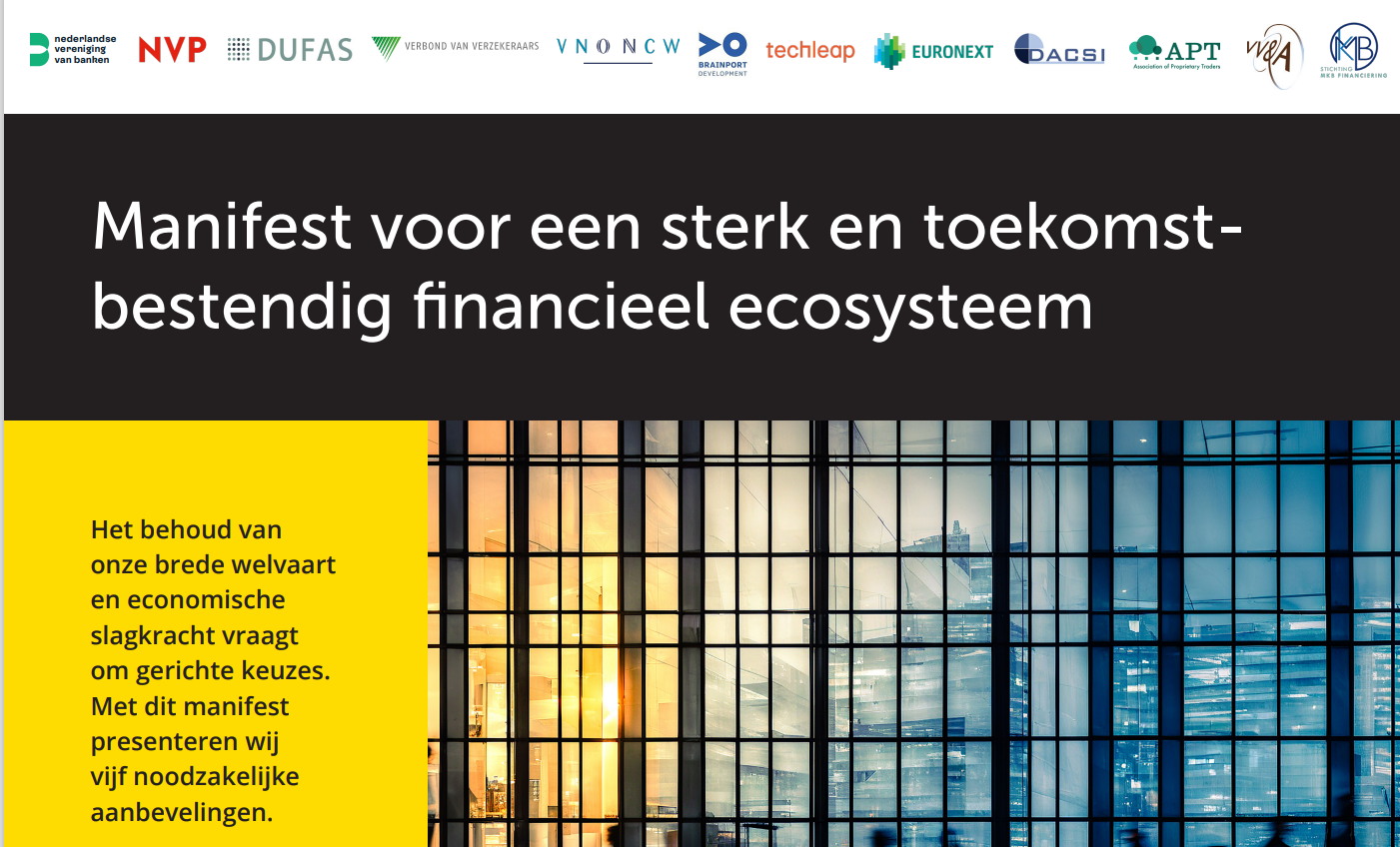Direct op de hoogte
Sorteer op:

In januari publiceerde de Europese Commissie een call for evidence met als doel te komen tot Better Regulation. Vanuit DUFAS steunen we de doelstellingen van de Europese Commissie op het gebied van Better Regulation en het belang van evidence-based, proportionele en voorspelbare regelgeving. Tegelijkertijd benadrukken we dat effectieve regulering vraagt om duidelijke keuzes: niet alle risico’s kunnen of moeten worden weg gereguleerd. Regelgeving moet zich richten op materiële en systeemrelevante risico’s, met ruimte voor professioneel toezicht en marktwerking, zodat in urgente situaties snel en doelgericht kan worden gehandeld.

De Nederlandse financiële sector verwelkomt en ondersteunt de ambities van de nieuwe coalitie. Het akkoord is een stap in de goede richting om het verdienvermogen van de Nederlandse economie duurzaam te versterken. De financiële sector onderschrijft het belang van stabiel en voorspelbaar langjarig beleid. Vanuit die overtuiging reiken de betrokken organisaties het kabinet Jetten de hand om gezamenlijk te werken aan de verdere uitwerking en realisatie van de plannen. De sector gaat graag in gesprek over het wegnemen van overbodige nationale koppen op Europese regels, versterken van de kapitaalmarkt en verbeteren van het vestigingsklimaat.


Collaboration and knowledge sharing in the financial sector are essential for advancing sustainable finance. We are proud to have contributed to the publication of a new handbook on integrating impact into investment portfolios, developed by the Working Group on Integrating Impact under the Sustainable Finance Platform. The handbook brings together practical experience and academic insights in one shared educational document.

De Europese Commissie presenteerde in november het Supplementary Pensions Package, met voorstellen om aanvullende pensioenen in Europa te versterken. Het pakket bestaat uit aanbevelingen voor lidstaten en wetgevende voorstellen voor zowel de herziening van de IORP II-richtlijn als de PEPP-verordening. Vanuit DUFAS verwelkomen we dit pakket als een belangrijke stap richting sterkere en toekomstbestendige aanvullende pensioenen in Europa. Goed functionerende pensioenstelsels zijn essentieel voor adequate inkomens na pensionering en als een sleutel voor het mobiliseren van langetermijnkapitaal voor de Europese economie. Daarmee sluit het pensioenpakket direct aan bij de bredere ambities van de Savings and Investment Union (SIU). In onze positie gaan we in op een aantal aandachtspunten en aanscherpingen die van belang zijn voor een werkbare uitvoering voor vermogensbeheerders.

Op 12 februari organiseren we een lunchwebinar waarbij we je in één uur updaten over de formatie. Eind deze maand zal het minderheidskabinet van D66, VVD en CDA haar coalitieakkoord presenteren, en het streven is om 23 februari met de Koning op het bordes te staan. We kijken naar relevante ontwikkelingen voor onze sector, belangrijke personen en analyseren de politieke verhoudingen. Als gastspreker hebben we Elodie Verweij uitgenodigd. Elodie is politiek verslaggever voor het Algemeen Dagblad en werkte daarvoor onder andere bij Jinek en EenVandaag. We kijken ernaar uit je te verwelkomen.

Vanuit DUFAS verwelkomen we het Market Integration and Supervision Package (MISP) van de Europese Commissie als een belangrijke stap richting een beter functionerende en meer geïntegreerde Europese kapitaalmarkt. Het pakket past binnen de bredere ambitie om sparen en investeren in Europa te versterken en private kapitaalstromen beter te laten bijdragen aan economische groei, innovatie en strategische investeringen. Voor vermogensbeheerders die actief zijn in meerdere Europese lidstaten is verdere marktintegratie van groot belang. Hoewel de sector formeel opereert binnen één interne markt, ervaren beheerders in de praktijk nog steeds aanzienlijke verschillen in nationale regelgeving, toezichtpraktijken en administratieve processen. Deze fragmentatie leidt tot hogere kosten, langere doorlooptijden en onnodige complexiteit. Het MISP bevat voorstellen die deze obstakels gericht proberen weg te nemen.

Privium Fund Management is actief betrokken bij het Nederlandse en Europese beleidsdebat over vermogensbeheer en ziet in DUFAS een essentiële schakel tussen de sector en beleidsmakers. Daarom is Privium sinds december lid van DUFAS. In dit interview gaan Marlien Blaauw en Robert-Jan van Hoorn van Privium in op de rol van DUFAS binnen het steeds complexere regelgevend landschap, de belangrijkste ontwikkelingen en uitdagingen voor de sector in de komende jaren, en de manier waarop zij via commissies en expertgroepen willen bijdragen aan een sterke en toekomstbestendige vermogensbeheersector.

In November, together with CFA Society Netherlands, we hosted the Inclusive Leadership Today event. Throughout the day, we explored how inclusive leadership strengthens decision-making, enhances investment outcomes and builds resilience in times of change. An inclusive culture creates space for open dialogue — a key driver of success in investment management. A message that stood at the heart of the event. We are proud to look back on an inspiring and successful event.

Op 4 december publiceerde de Europese Commissie het Market Integration & Supervision Package (het ‘MIP-package’). Het pakket past binnen de bredere Savings and Investments Union-agenda en onderstreept de ambitie om kapitaal binnen de EU efficiënter te mobiliseren. Met dit pakket zet de Commissie een belangrijke stap richting verdere integratie van de Europese kapitaalmarkten, met als doel grensoverschrijdende kapitaalstromen te vergemakkelijken en marktfragmentatie te verminderen. Voor onze sector bevat het MIP-package meerdere relevante onderdelen. Het pakket biedt kansen om bij te dragen aan een beter functionerende interne markt, waarin grensoverschrijdende activiteiten worden vereenvoudigd en Europese vermogensbeheerders hun rol in de financiering van de economie verder kunnen versterken. Afgelopen zomer reageerde we vanuit DUFAS op de consultatie.

Om onze brede welvaart en ons verdienvermogen ook in de toekomst te kunnen garanderen, heeft Nederland grotere economische veerkracht nodig. Voor benodigde investeringen in en financiering van onder meer digitalisering, defensie en de energietransitie zijn acties en maatregelen nodig om de financiële sector de rol te geven die zij hiervoor kunnen en willen vervullen. Die oproep doet een brede coalitie van organisaties bedrijfsleven en financiële sector aan de informateur, de onderhandelende partijen én politiek en maatschappij in den brede.

Het Omnibus-stof is nog niet neergedaald, of de Europese Commissie heeft eind november alweer een volgend belangrijk voorstel gepubliceerd, namelijk voor herziening van de Sustainable Finance Disclosure Regulation (SFDR). De SFDR was in 2019 een van de eerste bouwstenen van het Europese raamwerk voor duurzame financiering. Omdat daarmee de transparantie rond duurzame financiële producten bij wet werd geregeld, heeft de SFDR een belangrijke bijdrage geleverd aan de verdere integratie van duurzaamheid in financiële producten en diensten. In de praktijk kwamen er echter al gauw onvolkomenheden aan het licht. Het was dus hoog tijd om de SFDR beter te laten aansluiten bij de behoeften van klanten en aanbieders van financiële producten.